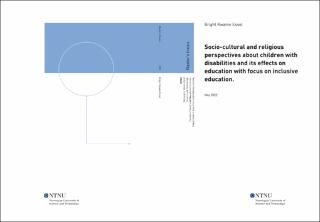| dc.contributor.advisor | Ida Marie Lyså | |
| dc.contributor.author | Essel Bright Kwame | |
| dc.date.accessioned | 2022-07-13T17:22:12Z | |
| dc.date.available | 2022-07-13T17:22:12Z | |
| dc.date.issued | 2022 | |
| dc.identifier | no.ntnu:inspera:110182733:50526216 | |
| dc.identifier.uri | https://hdl.handle.net/11250/3005294 | |
| dc.description.abstract | Barn med funksjonshemminger over hele verden møter mange opplevelser gjennom barndommen. Mennesker har ulike perspektiver på funksjonshemming generelt, og disse perspektivene påvirkes av ulike faktorer som enten kan være sosiokulturelle eller religiøse når de begrenses til en ghanesisk setting. Derfor tar denne studien sikte på å identifisere noen av disse sosiokulturelle og religiøse perspektivene som ghanesere har om barn med funksjonsnedsettelser, og å også undersøke om disse perspektivene påvirker tilgangen til utdanning for disse barna med hovedfokus på inkluderende opplæring. Data ble hentet fra ulike sekundære kilder som funn fra tidligere forskningsstudier og artikler, avispublikasjoner, videodokumentarer og rapporter fra lokale og internasjonale instanser.
Data fra disse kildene viste at barn med nedsatt funksjonsevne i Ghana opplever ulike former for diskriminering og forskjellsbehandling på grunn av sin funksjonshemming. Det ble videre avslørt at disse sosiokulturelle og religiøse perspektivene har stor innflytelse på tilgang til utdanning for barn med nedsatt funksjonsevne, spesielt i en inkluderende utdanningssetting. Funnene fra studien avslørte også at noen politiske og strukturelle beslutninger og barrierer hindrer effektiv og vellykket implementering av Ghanas politikk for inkluderende utdanning, og dermed gjør den eksklusiv i praksis. Funksjonshemming ble funnet å være et individs problem til tross for det ghanesiske samfunnets sterke tro på samhold. Studien ga noen anbefalinger som kan bidra til å eliminere noen, om ikke alle, av disse negative sosiokulturelle og religiøse perspektivene om barn med funksjonshemminger, og antydet også noen faktorer som kan bidra til å forbedre inkluderende utdanning i Ghana. | |
| dc.description.abstract | Children with disabilities all over the world face numerous experiences throughout their childhood. People have different perspectives about disabilities in general and these perspectives are influenced by various factors which could either be socio-cultural or religious when narrowed down to a Ghanaian setting. Therefore, this study aims at identifying some of these socio-cultural and religious perspectives that Ghanaians have about children with disabilities and to also examine whether these perspectives influence the access to education by these children with the main focus on inclusive education. Data were retrieved from different secondary sources such as findings from previous research studies and articles, newspaper publications, video documentaries and reports from local and international bodies.
Data from these sources revealed that, children with disabilities in Ghana experience various forms of discrimination and differential treatments because of their disability status. It was further revealed that these socio-cultural and religious perspective have a major influence on access to education by children with disabilities especially in an inclusive education setting. Findings of the study also revealed that, some political and structural decisions and barriers hinder the effective and successful implementation of Ghana’s Inclusive Education policy hence, making it exclusive in practice. Disability was found to be an individual’s problem despite the Ghanaian society’s strong believe in togetherness. The study made some recommendations that may help to eliminate some if not all of these negative socio-cultural and religious perspectives about children with disabilities and also suggested some factors that can help improve inclusive education in Ghana. | |
| dc.language | eng | |
| dc.publisher | NTNU | |
| dc.title | Socio-cultural and religious perspectives about children with disabilities and its effects on education with focus on inclusive education | |
| dc.type | Master thesis | |
